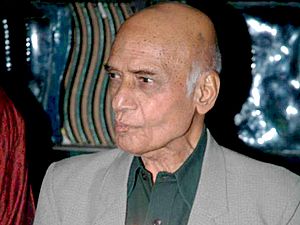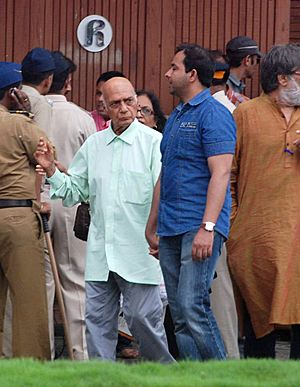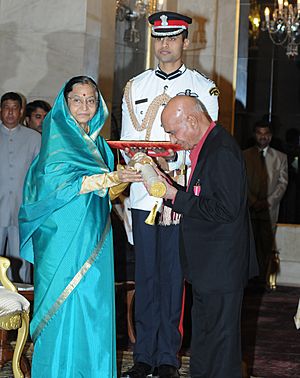Mohammed Zahur Khayyam facts for kids
Quick facts for kids
Mohammed Zahur Khayyam
|
|
|---|---|

Khayyam at his 85th birthday bash in 2012
|
|
| Born | 18 February 1927 Rahon, Punjab, British India
|
| Died | 19 August 2019 (aged 92) Mumbai, Maharashtra, India
|
| Occupation | Music director, film score composer |
| Known for | Umrao Jaan Kabhi Kabhie Razia Sultan Dil-e-Nadaan Dard Thodisi Bewafai |
| Spouse(s) |
Jagjit Kaur
(m. 1954) |
| Children | 1 |
| Honours | Padma Bhushan |
Mohammed Zahur Khayyam Hashmi (born February 18, 1927 – died August 19, 2019) was an Indian music director. He was better known as Khayyam. He created music for movies for over 40 years.
Khayyam won many awards for his music. He received three Filmfare Awards. These included "Best Music" for Kabhi Kabhie (1977) and Umrao Jaan (1982). He also got a Lifetime Achievement Award in 2010. In 2007, he won the Sangeet Natak Akademi Award for Creative Music. The Indian government also honored him with the Padma Bhushan in 2011. This is one of India's highest civilian awards.
Contents
Early life and training
Khayyam was born on February 18, 1927. His family lived in Rahon, Punjab, which was part of British India. When he was a boy, Khayyam ran away from home. He went to his uncle's house in New Delhi. There, he learned music from a famous singer and composer, Pandit Amarnath.
Music career highlights
Khayyam went to Lahore to find work in films. He met Baba Chishti, a well-known music director. Chishti was impressed by Khayyam's singing. He offered Khayyam a job as his assistant. Khayyam worked with Chishti for six months. He was only 17 years old at the time.
After serving in the Second World War, Khayyam moved to Mumbai. He started his music career as "Sharmaji" in 1948. He was part of a duo called "Sharmaji-Varmaji." Their first film was Heer Ranjha. Later, his partner moved to Pakistan. Khayyam then started working alone.
One of his first big hits was the song "Akele Mein Woh Ghabrate To Honge" from the film Biwi (1950). Another popular song was "Shaam-e-Gham Ki Kasam" from Footpath (1953). He became even more famous with the film Phir Subha Hogi (1958). Songs from this movie, like "Wo Subha Kabhi To Aayegi," became very popular.
Khayyam's reputation grew with songs from Shola Aur Shabnam (1961). In 1966, the film Aakhri Khat had big hits like "Baharon Mera Jeevan Bhi Sawaron." His wife, Jagjit Kaur, also sang songs in his film Shagoon (1964).
In the 1970s, Khayyam worked on the film Kabhi Kabhie (1976). This movie showed how talented he was. Songs like "Kabhi Kabhi Mere Dil Mein Khayal Aata Hai" are still loved today.
He continued to make music for many films in the late 1970s and early 1980s. Some of these films include Trishul, Thodi Si Bewafaai, and Noorie.
His best work came in 1981 with the film Umrao Jaan. The songs from this movie, such as "In Aankhon Ki Masti Ke" and "Dil Cheez Kya Hai," are considered timeless classics.
Rajesh Khanna, a famous actor, loved Khayyam's music so much that he gave Khayyam one of his cars. Khayyam then composed music for more of Khanna's films, including Thodisi Bewafai and Dard.
In 1983, Khayyam created music for the film Razia Sultan. The song "Aye Dil-e-Nadan" from this movie is considered a masterpiece.
Khayyam also composed music for non-film songs and albums. He worked on an album for the poet Meena Kumari in 1971. He liked working with poets because he felt it made the songs more meaningful. His music often had a touch of ghazal (a type of poem) and was based on Indian classical music. His songs were known for being soulful and emotional.
Generosity and personal life
On his 89th birthday, Khayyam announced a special plan. He decided to donate all his wealth to a trust. This trust, called "Khayyam Jagjeet Kaur KPG Charitable Trust," helps new artists and technicians in India. He wanted to support others in the music industry.
In 2019, he chose not to celebrate his birthday. Instead, he donated money to the families of soldiers who died in an attack.
Khayyam married Jagjit Kaur in 1954. Their marriage was one of the first between different communities in the Indian film industry. They had a son named Pradeep, who passed away in 2012. Inspired by their son's helpful nature, they started the "Khayyam Jagjit Kaur Charitable Trust" to help artists in need.
Later years and passing
In his last days, Khayyam was unwell due to his age. He was admitted to a hospital in Mumbai in July 2019 because of a lung infection. He passed away on August 19, 2019, at the age of 92. He was buried the next day with full state honors.
Awards and recognition
Khayyam received many important awards for his contributions to music:
- 1977: Filmfare Best Music Director Award for Kabhi Kabhie
- 1982: Filmfare Best Music Director Award for Umrao Jaan
- 1982: National Film Award for Best Music Direction for Umrao Jaan
- 2007: Sangeet Natak Akademi Award for Creative Music
- 2010: Filmfare Lifetime Achievement Award
- 2011: Padma Bhushan (a high civilian honor from the Indian government)
- 2012: Mirchi Music Lifetime Achievement Award
- 2018: Hridaynath Mangeshkar Award
Filmography (as singer)
Khayyam also sang in some films, especially early in his career:
- Romeo & Juliet (1947)
- Heer Ranjha (1948) — as Sharmaji
- Biwi (1950)
- Pyaar Ki Baatein (1951)
- Foot Path (1953) — this is when he started using the name Khayyam.
- Gul Sanobar (1953)
- Gul Bahar (1954)
- Dhobi Doctor (1954)
- Tatar Ka Chor (1955)
- Phir Subha Hogi (1958)
- Lala Rukh (1958)
- Barood (1960)
- Bombai Ki Billi (1960)
- Shola Aur Shabnam (1961)
- Shagoon (1964)
- Mohabbat Isko Kahete Hain (1965)
- Aakhri Khat (1966)
- Mera Bhai Mera Dushman (1967)
- I Write, I Recite (1971) — an album of poems written and sung by Meena Kumari.
- Pyaase Dil (1974)
- Sandhya (1975)
- Mutthi Bhar Chawal (1975)
- Sankalp (1975)
- Kabhi Kabhie (1976)
- Shankar Hussain (1977)
- Trishul (1978)
- Khandaan (1979)
- Noorie (1979)
- Meena Kumari ki Amar Kahani (1979)
 | James Van Der Zee |
 | Alma Thomas |
 | Ellis Wilson |
 | Margaret Taylor-Burroughs |



